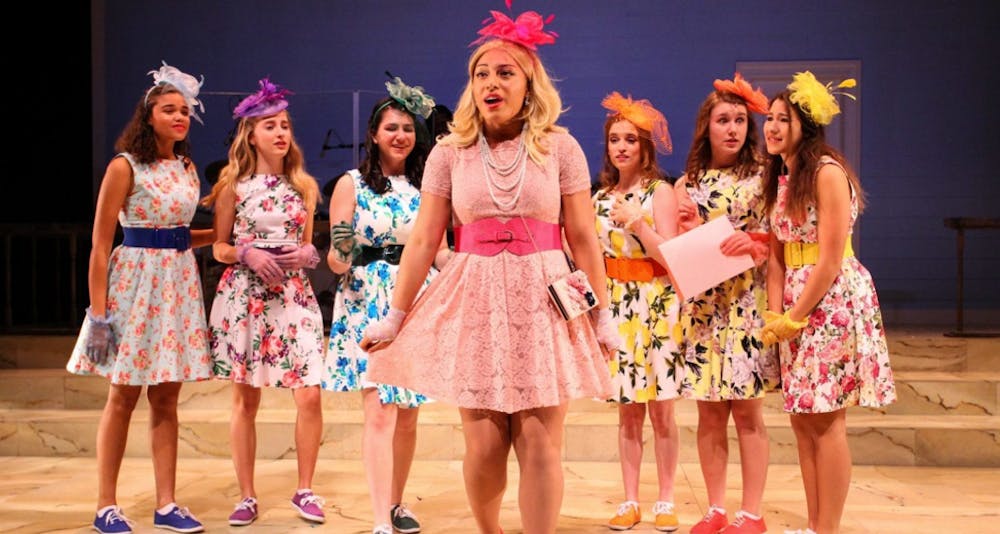A nontraditionally cast and smoothly executed production of “Legally Blonde” enjoyed a five-night run this November at McCarter’s Berlind Theatre. “Legally Blonde” has held audiences’ attention over the years through its smart combination of outrageous pettiness and superficiality with a feminist storyline: A young woman named Elle Woods learns to find identity within herself and through sisterhood, instead of seeking validation from men. But in casting a woman of color, Jasmeene Burton ’19, as the show’s blonde lead, director Tamia Goodman ’19 prompts the audience to think more broadly about journeys of self-discovery.
As with all shows, the little things play a big role in creating an overall effect. While the accessorizing Elle would perhaps disapprove of the minimalism of the stage and set, the lighting was able to capture the show’s personality.
Multicolored lights set the mood in various scenes. The stage is bathed in red as Harvard Law professor Callahan (Peter Foster ’21) sings “Blood in the Water,” a hyperbolic song about the ruthlessness of a law career. At other times the lighting provides a subtler effect: When Elle tells her love interest, Emmett (Alexander Deland Jr. ’21), that she plans to leave Harvard Law, individual spotlights are trained on each of them, and the sliver of shadow in between emphasizes the pain of separation.
The clean, bare aesthetic of the stage makes for fluid transitions and focuses attention on the actors, although it takes a few scenes for the characters to appear totally at home and for me as an audience member to completely buy into their world. As the show progresses, the actors show an impressive commitment to bringing the story to life in scenes such as Brooke Wyndham’s TV workout routine. Claudia Humphrey ’22, as Brooke Wyndham, along with her entourage, manages to pull off an onstage workout while singing without once sounding out of breath.
Overall, this production finds its voice most strongly in moments of nuance and tenderness, as opposed to flashy numbers like “Omigod You Guys.” The wonderful chemistry between Emmett and Elle makes for the show’s most convincing and touching moments.
Of course, the casting of a woman of color as Elle is designed to be the show’s central point. The program opens with the summary, “Elle, a woman of color, must navigate a new environment in her pursuit of love as she leaves her hometown and heads to Harvard Law School. We invite you to consider what it means to walk in a new skin and what it means to find acceptance.” The show proves that efforts at diversity such as the casting of minorities in roles as traditionally white as Elle’s can be achieved at no cost to — and to the benefit of — a production’s success.
The script itself appears unaltered. During the show, the audience is still primarily caught up in the story of a wealthy sorority girl finding a way to fit into a “serious” academic environment — and finding herself in the process. But upon leaving the theater, audience members may find a point of connection between Elle’s experience in an elite academic environment and the experiences of people of color in these spaces.
The show also nods to the experiences of LGBTQ+ individuals with the casting of Will Alvarado ’19 as a woman character — Elle’s hairdresser and friend, Paulette Bonafonté. Paulette also undergoes a journey of finding self-acceptance, courage, and love over the course of the musical.
Nonetheless, there are limits to what the show sets out to do. Casting choices alone cannot make a show like Legally Blonde a story truly about minority identities and experiences. We are reminded of these limits by slightly cringe-worthy moments in the script itself, such as when Paulette calls Elle “genetically blessed” for having blonde hair or when Nikos is outed in court as gay and accused of lying about an affair with Brooke Wyndham, because his relationship with a man apparently negates any possibility of a relationship with a woman.
We should keep in mind that alongside shows with inclusive casting that make us think critically about traditional white narratives, we also need more shows that engage directly with minority narratives. This thoughtful rendition of “Legally Blonde” pushes the Princeton community to continue opening up these spaces in theater with intentionality.









